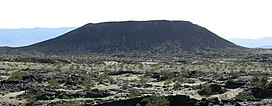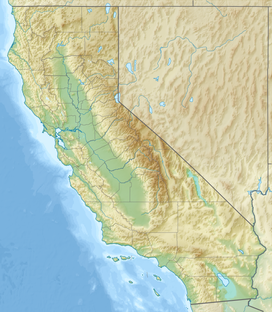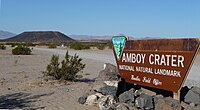Amboy Crater
| Amboy Crater | |
|---|---|
 Amboy Crater, as viewed from the east | |
| Highest point | |
| Elevation | 944 ft (288 m)[1] |
| Prominence | 250 ft (76 m)[2] |
| Coordinates | 34°32′38″N 115°47′28″W / 34.5438831°N 115.7911091°W[3] |
| Geography | |
| Topo map | USGS Amboy Crater[3] |
| Geology | |
| Mountain type | Cinder cone[2] |
| Last eruption | About 10,000 Years Ago[4] |
| Climbing | |
| Easiest route | Trail[1][5][6] |
| Designated | May 1973 |


Amboy Crater is a dormant cinder cone volcano that rises above a 70-square-kilometer (27 sq mi) lava field in the eastern Mojave Desert of southern California, within Mojave Trails National Monument.[2][4]
It is about 75 miles (120 km) equidistant from Barstow to the west and Needles to the east, and 1.5 miles (2.4 km) south of historic U.S. Route 66, near the town of Amboy in San Bernardino County. In 1973, Amboy Crater was designated the Amboy Crater National Natural Landmark.[2][7]

Location[edit]
The crater's location is 2.5 miles (4.0 km) southwest of the town of Amboy and the Route 66-National Trails Highway. The Bullion Mountains are to the west, and the Bristol Mountains to the northeast.[4]
Description[edit]
This cinder cone is estimated to be 79,000 years old (+/- 5,000 years)[8][9] and was formed in layers of mostly vesicular pahoehoe during the Pleistocene geological period. The interior has a solidified lava lake. Lava flows as old as Amboy Crater itself blanket the surrounding area. The most recent eruption was approximately 10,000 years ago.[4]
The crater is 944 ft (288 m) above sea level, about 250 ft (76 m) above the surrounding basalt lava plains. The scenic and solitary Amboy Crater was a popular sight and stop for travelers on U.S. Route 66 in California before the opening of Interstate 40 in 1973. Other than a stretch of U.S. Route 66 in New Mexico, Amboy Crater is one of just a few extinct volcanoes along the entire route, so generations of U.S. Route 66 travelers from the 1920s through the 1960s could boast that they had climbed a real volcano. Visits decreased after Interstate 40 opened, but have increased in recent years with the nearby Mitchell Caverns, Mojave National Preserve, and renewed historical tourism interest in "old Route 66".
Visiting[edit]
-
Amboy Crater National Landmark sign
The Federal Bureau of Land Management (BLM) recommends using the Western Cone Trail to reach the volcano peak's rim, a steep and rocky hiking trail.[1] The trailhead is at the Amboy Crater day-use parking area, which provides shaded and open picnic tables and public restrooms. Regular desert precautions apply here: being alert for rattlesnakes and old military explosives, and having a hat, sunscreen, sturdy shoes and abundant drinking water. Educational and organized groups are advised to contact the BLM before going to Amboy Crater.[2][4][10]
Media[edit]
Amboy Crater was used as a location in the 1959 movie Journey to the Center of the Earth, with matte paintings used to alter the shape of the cone and place it within the landscape of Iceland. Fires were set inside the crater to simulate a volcanic eruption. Amboy Crater was also featured in the Viceland network show Abandoned, Season 1, episode 6: "Route 66". In HBO's From the Earth to the Moon Apollo 15 episode, Amboy Crater is overflown during astronaut training as a stand-in for the terrain of the San Francisco Volcanic Field outside of Flagstaff, AZ.[citation needed]
See also[edit]
References[edit]
- ^ a b c "Amboy Recreation Site" (PDF). BLM/CA/GI-2000/014+8322 REV. 6/07. Bureau of Land Management. June 2007. Archived from the original (PDF) on 2016-03-08. Retrieved 2016-03-03.
- ^ a b c d e "Amboy Crater National Natural Landmark". Needles Field Office. Bureau of Land Management. 2008-04-22. Archived from the original on 2008-09-17. Retrieved 2016-03-03.
- ^ a b "Amboy Crater". Geographic Names Information System. United States Geological Survey, United States Department of the Interior. Retrieved 2014-12-28.
- ^ a b c d e "Amboy Crater" (PDF). BLM/CA/GI-2000/014+8322 REV. 6/07. Bureau of Land Management. June 2007. Archived from the original (PDF) on 12 October 2008. Retrieved 3 March 2016.
- ^ McKinney, John (2006-03-31). California's Desert Parks: A Day Hiker's Guide. Wilderness Press. pp. 146–147. ISBN 978-0-89997-389-0.
- ^ Massey, Peter (2006-04-26). Backcountry Adventures Southern California: The Ultimate Guide to the Backcountry for anyone with a Sport Utility Vehicle. Adler Publishing. pp. 475–477. ISBN 978-1-930193-26-0.
- ^ "National Natural Landmark Summary". National Park Service. February 5, 2004. Archived from the original on 7 May 2009. Retrieved 2016-03-03.
- ^ Phillips, Fred M. (2003). "Cosmogenic 36Cl ages of Quaternary basalt flows in the Mojave Desert, California, USA". Geomorphology. 53 (3–4): 199–208. Bibcode:2003Geomo..53..199P. doi:10.1016/S0169-555X(02)00328-8.
- ^ http://alliance.la.asu.edu/rockart/vmltest/PhillipsMojaveTest.pdf Archived 2014-02-22 at the Wayback Machine . accessed 3/25/2013
- ^ BLM Needles Field Office: telephone number - 1 760 326 7000 (to ensure adequate group parking availability)
External links[edit]
 Media related to Amboy Crater at Wikimedia Commons
Media related to Amboy Crater at Wikimedia Commons- "Amboy". Global Volcanism Program. Smithsonian Institution. Retrieved 2021-06-28.
- Amboy Crater National Natural Landmark at the Bureau of Land Management website
- Cinder cones of the United States
- Volcanoes of San Bernardino County, California
- Mojave Trails National Monument
- National Natural Landmarks in California
- Natural history of the Mojave Desert
- Protected areas of the Mojave Desert
- Protected areas of San Bernardino County, California
- Volcanic fields of California
- Bureau of Land Management areas in California
- Tourist attractions along U.S. Route 66
- Volcanoes of California
- IUCN Category V


